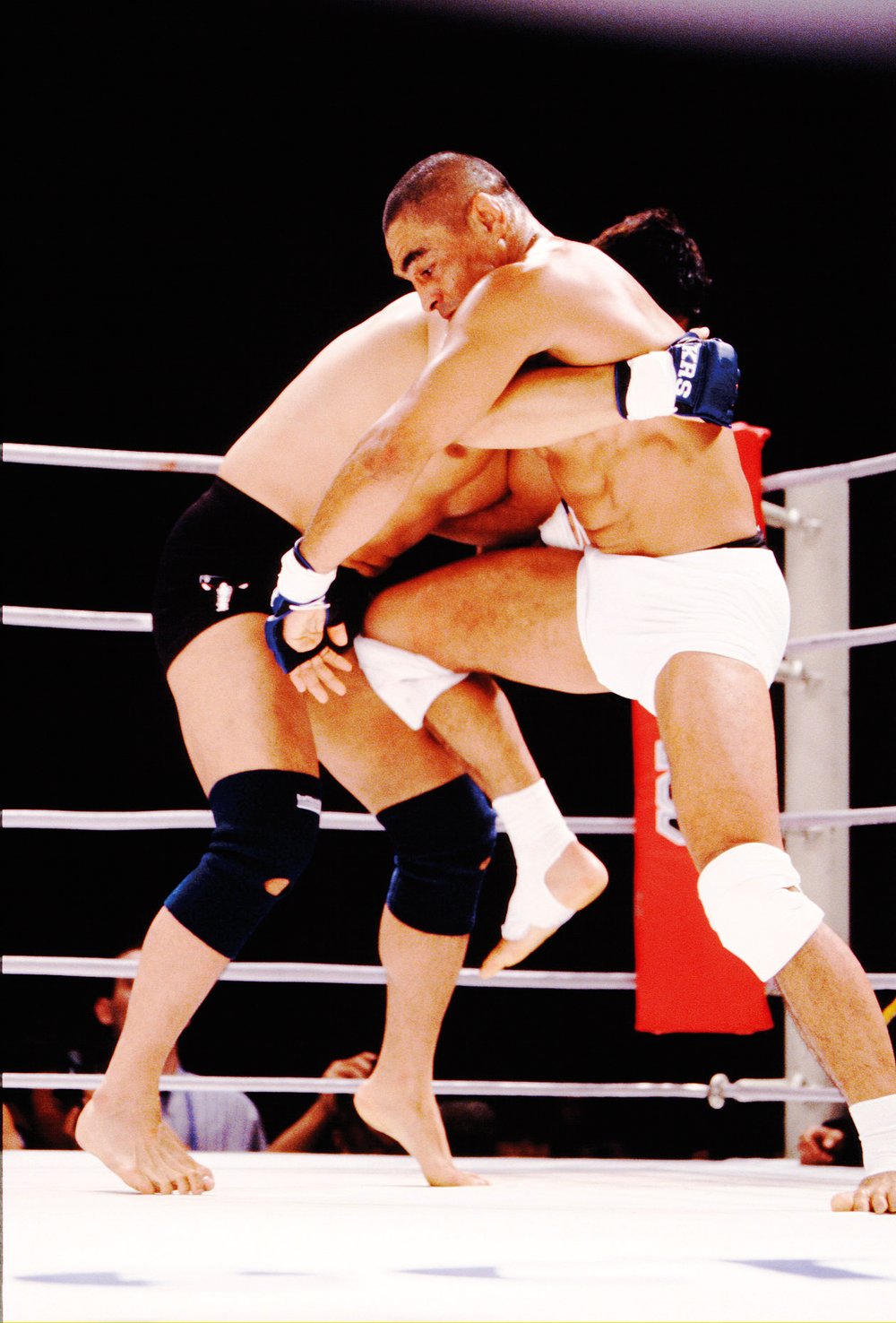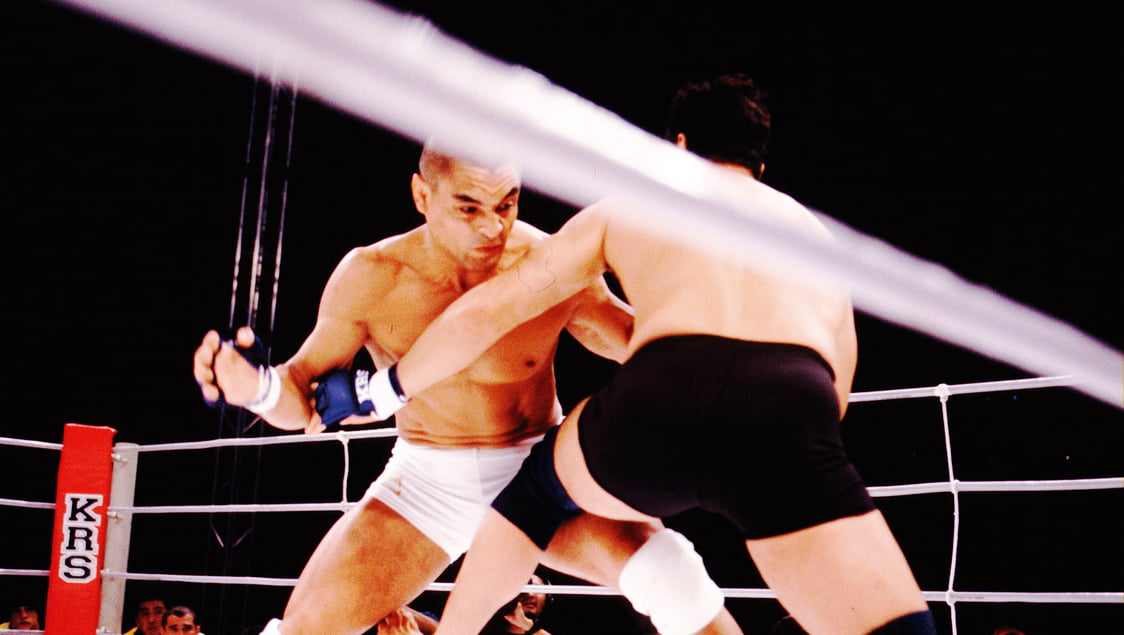
Issue 007
September 2005
How old are you?
I’m ageless — I’m old enough to know a lot of tricks and young enough to keep my mind open and still learning.
How long have you been training in jiu-jitsu?
Since I was in my Dad’s genes, this is something I was born into. I was already involved in the training before I was aware of what I was doing. I was just developing grip, base weight distribution. Then when I became a little more aware of what I was doing as a baby, [it] was adapted to the martial arts. The same way I do with my kids.
I’ve read articles and seen shows where you can see how you play with your kids, showing them jiu-jitsu before they can walk. Did your father do that with you?
Yes, because kids are very interested in the mechanics and to play and roll. Wrestling is a very natural thing for kids. What happens is as they get a little older they get a little too violent and the parents, when they don’t know much, they say: “Oh stop, don’t do this.” But when the parents are involved in this [jiu-jitsu] they are able to channel this in the perfect direction, so the moves are easily learnt and the kids are very comfortable in the sport.
Where in Brazil are you from?
Rio de Janeiro.
At which academy do you teach now?
I have my own place here in Santa Monica.
How long has it been since you last competed?
2000 was my last event, at the Coliseum 2000. It was the premiere event of the year in Japan, it sold out the Tokyo Dome; about 30 million people watching on TV plus 60,000 in the stadium. Against Funaki, the King of Pancrase.
How does it feel to know you have inspired so many people and have become a legend in your own time?
It is an overwhelming feeling which makes me proud to be a positive role model for so many great athletes and also a good inspiration in many different senses. It makes me proud, but also very humble because it’s more about the beauty of the sport than myself as a person.
Who would you say has been your toughest opponent in MMA?
It’s hard to say, because when you have a perfect game you may take longer, but you end up in the same sequence and end up in the same way. Maybe the worst opponent for me was my first fight with Zulu, in the eighties, because it was my first fight. I had no experience and I started to get uncomfortable with my own feelings of getting tired. So my mind started to play tricks on me. If it was not for my father and my brother Rolls I would have almost given up on the fight because I thought I was the only one getting tired. Then my father pushed me into the ring again and three minutes later Zulu was sleeping. It was at this point I realized my worst enemy was my own mind and I started to deal better with my own thoughts, and since then things have not been too difficult
And the same with just straight-up Brazilian Jiu-Jitsu (BJJ) with a gi: who was your most difficult opponent.
There was not any one person that gave me trouble because all my competition matches were never won by points, they were all won by submission, and maybe 80% of the time my wins were in less than three minutes. I’d say my toughest opponents were the ones that lasted six or seven minutes, maximum eight minutes for a fight. Fortunately, I felt it was just a matter of adjustment, but I never felt a lot of pressure from an opponent.
Do you feel the game of jiu-jitsu has changed a great deal since the days when you were competing?
Oh, definitely yes. The rules of the tournaments today favor victory by a little advantage and a lot of stalling. So you don’t see the action going toward a submission. The points just follow along but the primary goal should be the submission. Some people are satisfied to win the match just by an advantage with no focus on submissions and controlling.
How often do you roll now?
I try to roll as much as I can. I don’t train with too much intensity these days; I try to maintain good timing and good performance at an average level. Waiting for the moment I have to peak for an event and then I will intensify my nutrition, my strength training and also my skill training to get a more precise timing. Other than that I just try to be connected with the mat, and also my actual routine as far as my hobbies, my exercise, my surfing and these things keep me in good shape — nothing too heavy and never stop. I just try to be consistent.

Do you have any competitions coming up?
I am very excited about the possibility of fighting, even this year, [this interview was recorded during the 2005 ADCC] but there is nothing confirmed yet. Until I sign I am just anxious to see the outcome of any negotiations.
Are you allowed to disclose who you have been talking to?
Right now it is with some promoters that are trying to negotiate, but it is at an early stage. What makes it worse for me is there is nobody who really stands out to make a huge event. There are about 20 great martial artists today but nobody really stands out above the others to maybe create what might be the biggest fighting event at the present time, and because I charge a lot of money it makes it hard for the promoters to capitalize.
Who are your outstanding students in BJJ and MMA today?
I have Rany [Rany had just fought Leo Vieira in the finals at the ADCC, losing in the end after battling for nearly an hour], who had a great fight in the finals at ADCC in the light division. I have my son Kron, two or three more guys, Kevin, Shane are all ready to go, they are just polishing their skills for a good opportunity. I don’t like to put them in just any event, I like to be more selective. Allowing them to compete in BJJ just to keep them on their toes basically, but for MMA it has to be something special.
Do you see Kron wanting to get into MMA as he gets older?
Oh definitely, if he wants to, I don’t want to put pressure on him. I think it is negative if I expect too much. I just let things flow. He already has enough pressure on him by being my son. He is doing everything by the book to be the best he can be and I am very proud of him. So let’s see what the future has for us.
In which countries do you have schools?
I have representatives, I don’t have schools, but I have representatives all over the world through my association. I have one in England — Dean Taylor in Gravesend, Kent — Harold Harder in Holland, in Japan, in Brazil and [the] United States, so it’s going pretty well.
[All Rickson’s associations can be found at www.rickson.com.]
Do you plan to do any tours to visit any of your schools?
Yes, I will visit Japan shortly. It depends on my schedule but I can’t usually do seminars because it is not very profitable for me. I do seminars just for the association, smaller ones. But whenever I have some spare time I like to roll with the guys everywhere.
Where do you live now?
Near Santa Monica.
When you are competing what is your favorite position to work from, the top or bottom?
I think one of the qualities of a good fighter is to not have a favorite, up until now my opponents don’t know what I’m good at. I really feel I understand the game in a very complex way: I am comfortable to throw, to avoid throws, to pass the guard, to defend, on the top, on the bottom, in any position. I just wait for my opponent to make a mistake so I can capitalize on it.
Who were your inspirations when you were coming up through the ranks to gain your black belt and even today?
Being a member of the Gracie family, the inspiration is more to represent the family and, of course, my father Rolls, Carlson [and] all the older guys who represent. They are a living motivation for me to do my best in every tournament and every time I train.
When did you first come to the United States?
In 1989.
Where was your first academy?
I came here to support my brother and we worked together, and the first Gracie academy was in Torrance, California. After that I went to teach in my own place in West Los Angeles, then to Pacific Palisade and now West LA again on Wiltshire Boulevard.
Who was your first non-Brazilian black belt?
Chris Sanders, Harry Atkins, David Kama.










